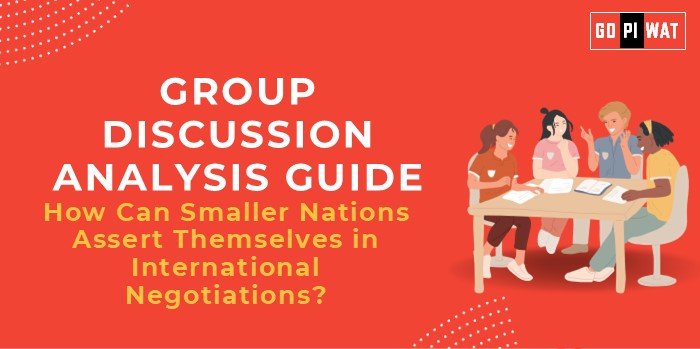📋 Group Discussion Analysis Guide: How Can Smaller Nations Assert Themselves in International Negotiations?
🌐 Introduction to the Topic
- 📌 Opening Context: In an era of global interdependence, smaller nations often find themselves grappling with the challenge of protecting their interests in negotiations dominated by larger, more powerful states. Yet, examples abound of these nations leveraging strategic partnerships, international law, and innovative diplomacy to amplify their voices.
- 📖 Topic Background: The historical asymmetry in international negotiations has often placed smaller nations at a disadvantage. However, the post-Cold War era, with its proliferation of multilateral organizations and alliances, has created spaces for smaller states to assert influence. Recent cases like climate change negotiations and trade discussions show how even limited resources can be used effectively.
📊 Quick Facts and Key Statistics
🌍 Global Trade Dependence: Small states account for 60% of global trade by volume, emphasizing their importance despite limited power.
🌡️ COP26 Advocacy: Island nations pushed for the 1.5°C target, shaping global climate commitments.
🗳️ UNGA Membership: Small nations form 58% of the UN General Assembly, giving them significant voting power.
💰 ASEAN GDP: The ASEAN bloc, a coalition of smaller nations, accounts for $3.6 trillion GDP, demonstrating collective economic weight.
🌡️ COP26 Advocacy: Island nations pushed for the 1.5°C target, shaping global climate commitments.
🗳️ UNGA Membership: Small nations form 58% of the UN General Assembly, giving them significant voting power.
💰 ASEAN GDP: The ASEAN bloc, a coalition of smaller nations, accounts for $3.6 trillion GDP, demonstrating collective economic weight.
👥 Stakeholders and Their Roles
- 🏛️ Governments of Smaller Nations: Strategize to protect sovereignty and economic interests.
- 🌍 Regional Organizations: Amplify collective bargaining power (e.g., CARICOM, ASEAN).
- 📌 International Institutions: Provide platforms like the UN or WTO for smaller nations to advocate effectively.
- 🌱 Civil Society and NGOs: Advocate for global issues (e.g., climate justice) supporting smaller nations’ positions.
🏆 Achievements and Challenges
✨ Achievements:
- 🌍 Climate Advocacy Success: The Paris Agreement reflects the influence of vulnerable nations like the Marshall Islands.
- 🤝 Economic Integration: ASEAN’s Regional Comprehensive Economic Partnership demonstrates collective negotiation success.
- 🔍 Strategic Alliances: Qatar’s mediation efforts in global conflicts underline small-state diplomacy’s efficacy.
⚠️ Challenges:
- 💰 Resource Constraints: Limited financial and human resources hinder prolonged negotiation efforts.
- ⚖️ Geopolitical Marginalization: Smaller nations face difficulty in setting agendas dominated by superpowers.
🌍 Global Comparisons:
- ✔️ Singapore: Strategic diplomacy and economic prowess.
- 🌱 Bhutan: Environmental leadership demonstrates innovative diplomacy.
Case Studies:
- 🌊 COP27: Fiji’s leadership in advocating for climate adaptation funds.
- 🎣 Iceland: Leveraging sustainable fishing rights in international agreements.
📢 Structured Arguments for Discussion
- ✅ Supporting Stance: Smaller nations can influence negotiations by leveraging international law and collective diplomacy.
- ❌ Opposing Stance: Power imbalances often undermine the effectiveness of small-state strategies.
- ⚖️ Balanced Perspective: While smaller nations face challenges, strategic alliances and soft power enable them to overcome significant barriers.
🧠 Effective Discussion Approaches
- 🎯 Opening Approaches:
- Cite specific success stories like Fiji’s climate advocacy.
- Begin with a striking statistic on trade or UN voting power.
- 🤝 Counter-Argument Handling:
- Reference the importance of alliances like the G77 in countering power asymmetry.
- Highlight case studies of successful small-state leadership.
📊 Strategic Analysis of Strengths and Weaknesses
- Strengths: UNGA majority membership, leveraging moral authority; Innovative diplomacy examples like Costa Rica’s peace efforts.
- Weaknesses: Limited defense and economic resources.
- Opportunities: Growing importance of multilateralism and regional trade.
- Threats: Rising nationalism and unilateralism in major powers.
🎓 Connecting with B-School Applications
- 💼 Real-World Applications: Projects on global governance, trade policy, and sustainability can link to this topic.
- 📚 Sample Interview Questions:
- “How can small nations leverage international law in climate change negotiations?”
- “Discuss the role of ASEAN in balancing global trade dynamics.”
- 💡 Insights for Students:
- Importance of coalition-building.
- Relevance of regional alliances in global business.


